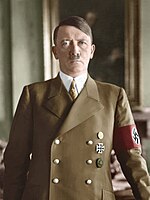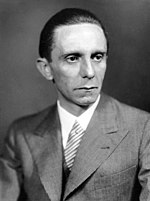User:Doctor Papa Jones/Nazi power
Once in power, the Nazis moved to eliminate all forms of opposition. All parties besides the NSDAP was banned, their leaders arrested, and old rivals, such as
Hermann Göring, who had joined the party in 1923, became commander of the Luftwaffe and promoted to Reichsmarschall (realm marshal), a rank senior to that of all military leaders. Heinrich Himmler, also a supporter since 1923, was named chief of all German police forces and internal security. Reinhard Heydrich, Himmler's protégé since 1931, controlled the Gestapo (secret state police) and Sicherheitsdienst (intelligence agency of the party). All branches of the military maintained their traditional influence on state matters as Hitler aimed to turn Germany into a military society. Other non-military leaders with significant influence over the country because of their association and friendship with the Führer included Joseph Goebbels and Martin Bormann. To maximize his own power and control of the people around him, Hitler encouraged competition and rivalry which resulted in a number of tense feuds in his inner circle.
Plenipotentiaries
| Name | Rank/position | Branch | Years of service | Notes | Image | Ref. |
|---|---|---|---|---|---|---|
| Adolf Hitler | Führer und Reichskanzler (leader and chancellor)
|
Nazi Party (NSDAP) | 1921-45 | 
|
||
| Albert Speer | Minister of Armaments and War Production | Nazi Party (NSDAP) | 1931-45 | 
|
||
| Erich Raeder | Großadmiral (grand admiral)
|
Kriegsmarine (navy) | 1894–1943 | 
|
||
| Heinrich Himmler | Reichsführer-SS (reich leader SS) | Schutzstaffel (protection squadron) | 1923-45 | 
|
||
| Hermann Göring | Reichsmarschall (realm marshal) | Luftwaffe (air force) | 1923-45 | 
|
||
| Joachim von Ribbentrop | Reich Minister for Foreign Affairs | Nazi Party (NSDAP) | 1932-45 | 
|
||
| Joseph Goebbels | Minister of Public Enlightenment and Propaganda | Nazi Party (NSDAP) | 1927-45 | 
|
||
| Karl Dönitz | Großadmiral (grand admiral)
|
Kriegsmarine (navy) | 1920–45 | File:Dönitz.jpg | ||
| Martin Bormann | Personal Secretary to the Führer | Nazi Party (NSDAP) | 1927-45 | 
|
||
| Reinhard Heydrich | SS-Obergruppenführer und General der Polizei (SS-supreme group leader and police general)
|
Schutzstaffel (protection squadron) | 1931-42 | 
|
||
| Rudolf Hess | Stellvertreter des Führers (deputy Führer)
|
Nazi Party (NSDAP) | 1920-41 | 
|
||
| Walther von Brauchitsch | Generalfeldmarschall (field marshal) | Heer (army)
|
1900–41 | 
|
||
| Wilhelm Keitel | Generalfeldmarschall (field marshal) | Oberkommando der Wehrmacht (supreme command of the armed forces) | 1901-45 | 
|
See also
Sources
Printed
Online
-
{{cite AV media}}: Empty citation (help)
